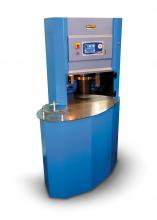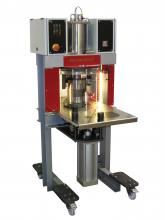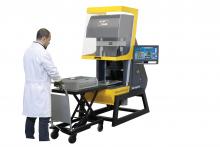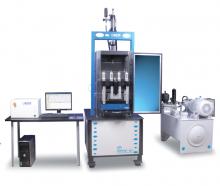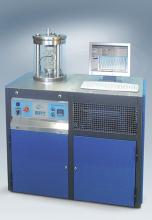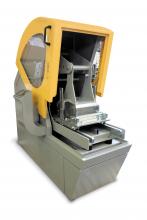The US’s Superpave standard is gaining dominance around the world – but there’s still work to be done where recycled material or other modifiers are added to the mix - Kristina Smith reports. A few years ago, there was still some debate in the testing world as to whether the US or European testing regimes would dominate. Today, it does seem that the US Superpave system is most widely used, albeit with local adaptations.
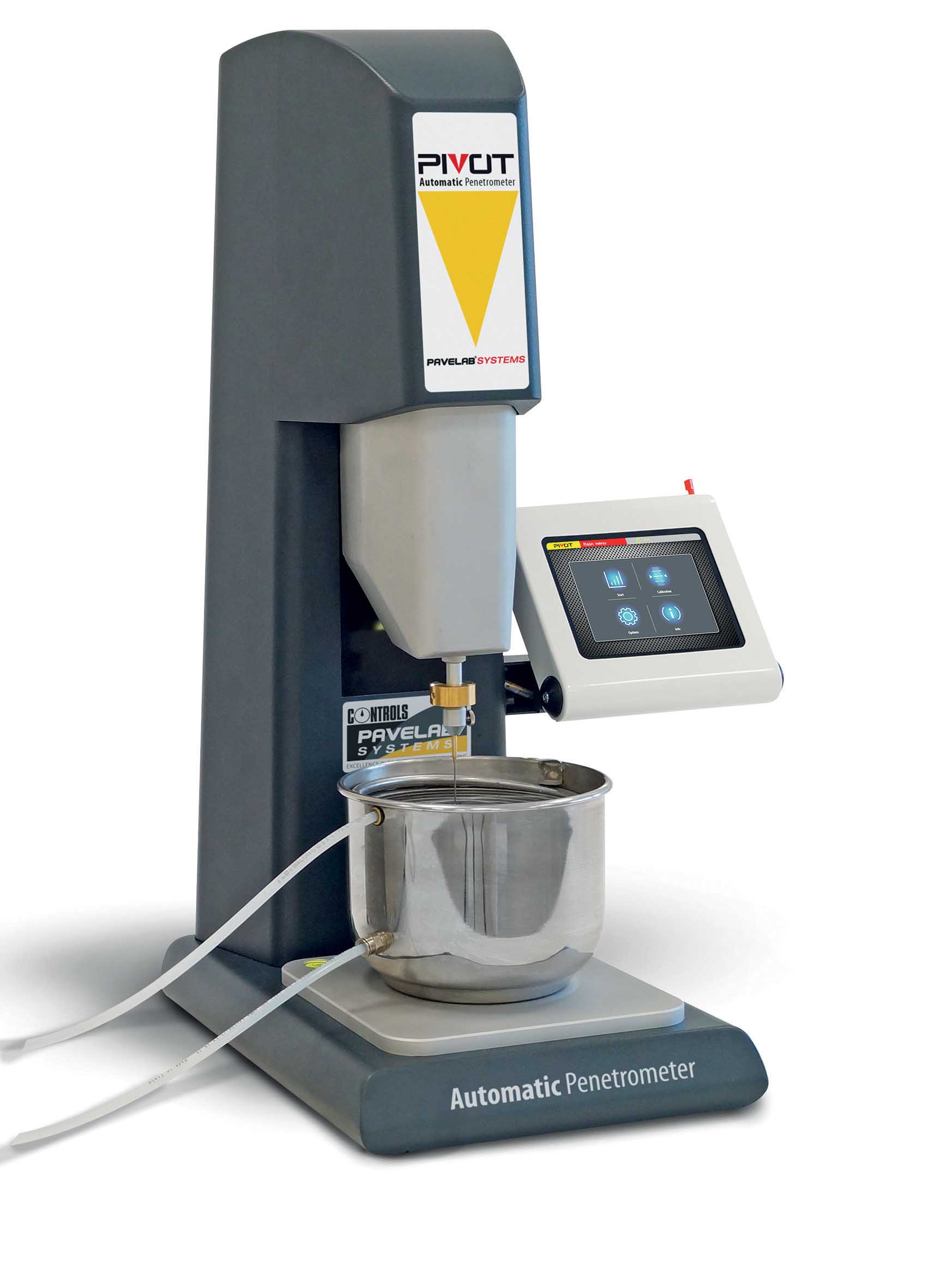
The new PIVOT penetrometer from Controls is fully automatic
The US’s Superpave standard is gaining dominance around the world – but there’s still work to be done where recycled material or other modifiers are added to the mix - Kristina Smith reports
A few years ago, there was still some debate in the testing world as to whether the US or European testing regimes would dominate. Today, it does seem that the US Superpave system is most widely used, albeit with local adaptations.
Andrew Cooper, CEO of7055 James Cox & Sons and director of research for 5941 Cooper Technology, highlights the vast investment and shared experience that has contributed to the development of the performance-based tests that underline the Superpave design method.
“In the US, you have 350 million people, all speaking the same language. There are differences state to state, but they are all tied together. Only Nevada has yet to go Superpave,” said Cooper. “Though there are 500 million people in Europe, they are not all singing from the same hymn sheet.”
In response, James Cox & Sons and parent company Cooper Technology have launched a new brand dedicated to Superpave. Meanwhile, Australian manufacturer3912 IPC Global which has been developing Superpave machines from the earliest stages is now producing second-generation equipment. Italian manufacturer 282 Matest has just sold a range of Superpave equipment to a university in Romania
However, experience in Indiana could indicate that more work needs to be done to develop tests which are relevant to newer types of mixes.
Both Cooper Technology and James Cox & Sons have a strong pedigree in research and development. James Cox & Sons designed and manufactured the prototype shear testing system for the Strategic Highways Research programme. Superpave Equipment will also benefit from the combined expertise of the two companies, according to Cooper.
“Superpave Equipment will also provide consultancy and assistance to countries which don’t have experience of Superpave yet,” said Cooper who was about to embark on a trip to Argentina, whilst colleagues visited Russia and Kazakstahn.
Many countries outside the US, including parts of the Middle East, China, Eastern Europe, Russia and South America are using or interested in the Superpave system, according to Cooper. Chile, for example, will adopt Superpave early next year.
Created over a number of years by the Strategic Highway Research Programme, the Superpave specification system initially saw the development of a number of performance-based testing methods and the associated equipment: Dynamic Shear Rheometer (DSR), Bending Beam Rheometer (BBR), Pressure Aging Vessel (PAV) and Gyratory Compactor. Cooper’s Superpave Equipment grouping includes all of the above machines, as well as equipment for more recently added tests.
Having sold 150 AMPTs around the world, many of them in the US, IPC Global can very comfortably claim to be the market leader for this type of machine, outselling any competitors by a ratio of 10-to-one, according to IPC Global chief executive Kieran McGrane.
“Over those 10 years we have been taking feedback from the market,” said McGrane. “There’s a continual process of developing new, novel asphalts which are being designed to perform at a wider range of temperatures and higher loading conditions. That means that the asphalt researchers and engineers want to perform tests over a broader range of temperatures and loads too.”
The AMPT PRO can test at temperatures as low as minus 4°C, compared to 4°C for first generation testers. It can also cool specimens much more quickly due to its re-engineering environmental control system, cooling from 23°C down to 4°C in under 20 minutes.
The forces the new machine can apply have also improved significantly, as engineers look to test mixes with higher modulus and stiffness. The AMPT PRO can apply forces of up to 19kN, compared to 15kN for the previous machine.
IPC Global has also increased the flexibility of the machine, making it simpler and faster to switch between different types of test. AMPTs, originally designed to carry out three tests, are required to perform a growing number of tests.
“Previously it was difficult to change between transducers,” said McGrane. “We’ve developed ‘plug-and-play’ signal conditioners which allow transducers and load cells to be switched over quickly. That also means that it can be adapted for new tests in the future.”
The machine benefits from improved ergonomics, says McGrane, with a redesigned control panel and touchscreen computer. The AMPT PRO can also come with an in-built compressor for laboratories that don’t have their own compressed air supply.
IPC Global became part of the Controls Group in 2014, which has allowed it to invest in recruiting more people to its team, as well as in developing the AMPT PRO and other forthcoming machines, says McGrane. While fully designed and manufactured in Australia, the AMPT PRO will benefit from Contols Group’s global distribution network.
The first AMPT PRO machine has been sold to the University of Costa Rica, with several more deals due to be signed.
2139 Controls Group has added PIVOT, a fully automatic penetrometer, to its CONTROLS PAVELAB SYSTEMS range. Conforming to the main international standards relating to penetration of bituminous materials, PIVOT features a fully automatic test cycle.
The penetration needle is lowered precisely by a stepper motor and the starting point automatically detected. The device is zeroed and the penetration test is automatically performed under the test parameters defined by the user, without need for any operator intervention.
A high-resolution contactless displacement transducer measures the penetration value which is recorded on a portable USB memory stick. A 145mm touchscreen provides a real-time display of functions such as penetration versus time curve.
A few years ago, there was still some debate in the testing world as to whether the US or European testing regimes would dominate. Today, it does seem that the US Superpave system is most widely used, albeit with local adaptations.
Andrew Cooper, CEO of
“In the US, you have 350 million people, all speaking the same language. There are differences state to state, but they are all tied together. Only Nevada has yet to go Superpave,” said Cooper. “Though there are 500 million people in Europe, they are not all singing from the same hymn sheet.”
In response, James Cox & Sons and parent company Cooper Technology have launched a new brand dedicated to Superpave. Meanwhile, Australian manufacturer
However, experience in Indiana could indicate that more work needs to be done to develop tests which are relevant to newer types of mixes.
Cooper Technology and James Cox & Sons
Superpave Equipment is the new brand for Cooper Technology and its US subsidiary James Cox & Sons: “We decided to have a dedicated branch of the company tied to Superpave, selling all the pieces of equipment which are involved. It’s not something that has been done before,” said Cooper.Both Cooper Technology and James Cox & Sons have a strong pedigree in research and development. James Cox & Sons designed and manufactured the prototype shear testing system for the Strategic Highways Research programme. Superpave Equipment will also benefit from the combined expertise of the two companies, according to Cooper.
“Superpave Equipment will also provide consultancy and assistance to countries which don’t have experience of Superpave yet,” said Cooper who was about to embark on a trip to Argentina, whilst colleagues visited Russia and Kazakstahn.
Many countries outside the US, including parts of the Middle East, China, Eastern Europe, Russia and South America are using or interested in the Superpave system, according to Cooper. Chile, for example, will adopt Superpave early next year.
Created over a number of years by the Strategic Highway Research Programme, the Superpave specification system initially saw the development of a number of performance-based testing methods and the associated equipment: Dynamic Shear Rheometer (DSR), Bending Beam Rheometer (BBR), Pressure Aging Vessel (PAV) and Gyratory Compactor. Cooper’s Superpave Equipment grouping includes all of the above machines, as well as equipment for more recently added tests.
IPC Global
IPC Global has totally redesigned its Asphalt Mixture Performance Tester (AMPT), launching the AMPT PRO which can perform tests under a wider range of temperatures and loads and gives greater flexibility in the types of test it can carry out.Having sold 150 AMPTs around the world, many of them in the US, IPC Global can very comfortably claim to be the market leader for this type of machine, outselling any competitors by a ratio of 10-to-one, according to IPC Global chief executive Kieran McGrane.
“Over those 10 years we have been taking feedback from the market,” said McGrane. “There’s a continual process of developing new, novel asphalts which are being designed to perform at a wider range of temperatures and higher loading conditions. That means that the asphalt researchers and engineers want to perform tests over a broader range of temperatures and loads too.”
The AMPT PRO can test at temperatures as low as minus 4°C, compared to 4°C for first generation testers. It can also cool specimens much more quickly due to its re-engineering environmental control system, cooling from 23°C down to 4°C in under 20 minutes.
The forces the new machine can apply have also improved significantly, as engineers look to test mixes with higher modulus and stiffness. The AMPT PRO can apply forces of up to 19kN, compared to 15kN for the previous machine.
IPC Global has also increased the flexibility of the machine, making it simpler and faster to switch between different types of test. AMPTs, originally designed to carry out three tests, are required to perform a growing number of tests.
“Previously it was difficult to change between transducers,” said McGrane. “We’ve developed ‘plug-and-play’ signal conditioners which allow transducers and load cells to be switched over quickly. That also means that it can be adapted for new tests in the future.”
The machine benefits from improved ergonomics, says McGrane, with a redesigned control panel and touchscreen computer. The AMPT PRO can also come with an in-built compressor for laboratories that don’t have their own compressed air supply.
IPC Global became part of the Controls Group in 2014, which has allowed it to invest in recruiting more people to its team, as well as in developing the AMPT PRO and other forthcoming machines, says McGrane. While fully designed and manufactured in Australia, the AMPT PRO will benefit from Contols Group’s global distribution network.
The first AMPT PRO machine has been sold to the University of Costa Rica, with several more deals due to be signed.
Controls
In Italy,The penetration needle is lowered precisely by a stepper motor and the starting point automatically detected. The device is zeroed and the penetration test is automatically performed under the test parameters defined by the user, without need for any operator intervention.
A high-resolution contactless displacement transducer measures the penetration value which is recorded on a portable USB memory stick. A 145mm touchscreen provides a real-time display of functions such as penetration versus time curve.

